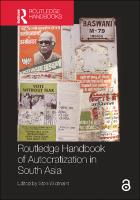Routledge Handbook of Autocratization in South Asia
Proposal review
| dc.contributor.editor | Widmalm, Sten | |
| dc.date.accessioned | 2021-12-15T16:02:06Z | |
| dc.date.available | 2021-12-15T16:02:06Z | |
| dc.date.issued | 2022 | |
| dc.identifier | ONIX_20211215_9781000486605_14 | |
| dc.identifier | OCN: 1291878401 | |
| dc.identifier.uri | https://library.oapen.org/handle/20.500.12657/52045 | |
| dc.description.abstract | This handbook offers a comprehensive analysis of the processes and actors contributing to autocratization in South Asia. It provides an enhanced understanding of the interconnectedness of the different states in the region, and how that may be related to autocratization. The book analyzes issues of state power, the support for political parties, questions relating to economic actors and sustainable economic development, the role of civil society, questions of equality and political culture, political mobilization, the role of education and the media, as well as topical issues such as the Covid pandemic, environmental issues, migration, and military and international security. Structured in five sections, contributions by international experts describe and explain outcomes at the national level in India, Pakistan, Bangladesh and Sri Lanka. The final section analyzes conditions for democracy and autocratization and how they are affected by the interplay of political forces at the international level in this region. India – building an ethnic state? Pakistan – the decline of civil liberties Bangladesh – towards one-party rule Sri Lanka – the resilience of the ethnic state How to comprehend autocratization in South Asia – three broad perspectives This innovative handbook is the first to describe and to explain ongoing trends of autocratization in South Asia, demonstrating that drivers of political change also work across boundaries. It is an important reference work for students and researchers of South Asian Studies, Asian Studies, Area Studies and Political Science. The Open Access version of this book, available at http://www.taylorfrancis.com, has been made available under a Creative Commons Attribution-Non Commercial-No Derivatives 4.0 license. | |
| dc.language | English | |
| dc.subject.classification | thema EDItEUR::J Society and Social Sciences::JP Politics and government | en_US |
| dc.subject.classification | thema EDItEUR::J Society and Social Sciences::JB Society and culture: general::JBS Social groups, communities and identities::JBSL Ethnic studies | en_US |
| dc.subject.classification | thema EDItEUR::G Reference, Information and Interdisciplinary subjects::GT Interdisciplinary studies::GTM Regional / International studies | en_US |
| dc.subject.other | Politics and government | |
| dc.subject.other | Ethnic studies | |
| dc.subject.other | Regional studies | |
| dc.title | Routledge Handbook of Autocratization in South Asia | |
| dc.type | book | |
| oapen.identifier.doi | 10.4324/9781003042211 | |
| oapen.relation.isPublishedBy | 7b3c7b10-5b1e-40b3-860e-c6dd5197f0bb | |
| oapen.relation.isbn | 9781000486605 | |
| oapen.relation.isbn | 9781003042211 | |
| oapen.relation.isbn | 9780367486747 | |
| oapen.relation.isbn | 9781032151021 | |
| oapen.imprint | Routledge | |
| oapen.pages | 398 | |
| peerreview.anonymity | Single-anonymised | |
| peerreview.id | bc80075c-96cc-4740-a9f3-a234bc2598f1 | |
| peerreview.open.review | No | |
| peerreview.publish.responsibility | Publisher | |
| peerreview.review.stage | Pre-publication | |
| peerreview.review.type | Proposal | |
| peerreview.reviewer.type | Internal editor | |
| peerreview.reviewer.type | External peer reviewer | |
| peerreview.title | Proposal review | |
| oapen.review.comments | Taylor & Francis open access titles are reviewed as a minimum at proposal stage by at least two external peer reviewers and an internal editor (additional reviews may be sought and additional content reviewed as required). |

